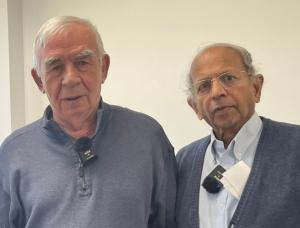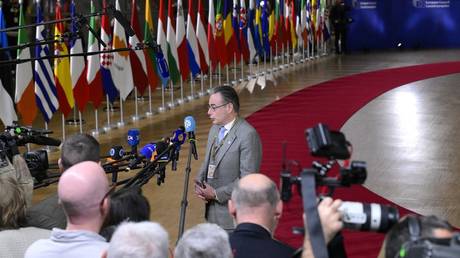ARTICLE AD BOX
Nanotechnology Discovery by 2023 Nobel Prize Winner Became Launch Pad to Create Permanent Magnets without Rare Earths from China
— Rameshwar Bhargava
NEW YORK, NY, UNITED STATES, December 19, 2023 /EINPresswire.com/ — Integrated Nano-Magnetics Corp, a wholly owned subsidiary of Nanocrystal Technology LP, was awarded a patent for technology built upon a fundamental nanoscience discovery made by Aleksey Yekimov, its former Chief Scientific Officer.
This patent will enable the creation of strong permanent magnets which are critically needed for both industrial and military applications but cannot be manufactured without certain “rare earth” elements available mostly from China.
At a glittering awards ceremony held in Stockholm on December10, 2023, three scientists, Aleksey Yekimov, Louis Brus (Professor at Columbia University) and Moungi Bawendi (Professor at MIT) were honored with the Nobel Prize in Chemistry for their discovery of the “quantum dot” which is now fueling practical applications in tuning the colors of LEDs, increasing the resolution of TV screens, and improving MRI imaging.
See: nobelprize.org/prizes/chemistry/2023/press-release/
As stated by the Royal Swedish Academy of Sciences, “Quantum dots are … bringing the greatest benefits to humankind. Researchers believe that in the future they could contribute to flexible electronics, tiny sensors, thinner solar cells, and encrypted quantum communications – so we have just started exploring the potential of these tiny particles.”
Aleksey Yekimov worked for over 19 years until his retirement as Chief Scientific Officer of Nanocrystals Technology LP, an R & D company in New York founded by two Indian-American entrepreneurs, Rameshwar Bhargava and Rajan Pillai.
Yekimov, who was born in Russia, had already received the highest scientific honors for his work before he immigrated to USA in 1999. Yekimov was greatly intrigued by Nanocrystal Technology’s research project and chose to join the company as its Chief Scientific Officer.
During its early years, the company worked on efficient light generation by doping host nanoparticles about the same size as a quantum dot with an additional impurity atom. Bhargava came up with the novel idea of incorporating a single impurity atom, a dopant, into a quantum dot sized host, and thus achieve an extraordinary change in the host material’s properties such as inducing strong permanent magnetism in weak, readily available paramagnetic materials. To get a sense of the scale at which nanotechnology works, and as vividly illustrated by the Nobel Foundation, the difference in size between a quantum dot and a soccer ball is about the same as the difference between a soccer ball and planet Earth.
Currently, strong permanent magnets are manufactured from “rare earths” available mostly in China which has established a near monopoly on the supply of rare-earth based strong permanent magnets. Permanent magnets are a fundamental building block for electro-mechanical devices such as motors found in all automobiles including electric vehicles, trucks and tractors, military tanks, wind turbines, aircraft engines, missiles, etc. They are also required for the efficient functioning of audio equipment such as speakers and cell phones as well as certain magnetic storage media.
The existing market for permanent magnets is $28 billion and is projected to reach $50 billion by 2030 in view of the huge increase in usage of electric vehicles. China’s overwhelming dominance in this field has become a matter of great concern to governments of all Western and other industrialized nations. As the Wall St. Journal put it, China’s now has a “stranglehold” on the economies and security of other countries.
The possibility of making permanent magnets without the use of any rare earths mined in China has intrigued leading physicists and chemists for nearly 30 years. On December 19, 2023, a U.S. patent with the title ‘’Strong Non Rare Earth Permanent Magnets from Double Doped Magnetic Nanoparticles” was granted to Integrated Nano-Magnetics Corp. Referring to this major accomplishment Bhargava said, “The pioneering work done by Yekimov, Brus and Bawendi has provided the foundation for us to make other discoveries in nanotechnology which will be of great benefit to the world.”
### END
Media contact:
Rajan Pillai
rajan@nanocrystalmagnetics.us
Mobile: +1 (917) 664-7036
Rajan Pillai
Nanocrystal Magnetics
+1 917-664-7036
rajan@nanocrystalmagnetics.us
![]()
Source link
The content is by EIN Presswire. Headlines of Today Media is not responsible for the content provided or any links related to this content. Headlines of Today Media is not responsible for the correctness, topicality or the quality of the content.
.png)
 1 year ago
15
1 year ago
15

 ,
,







 English (US)
English (US)